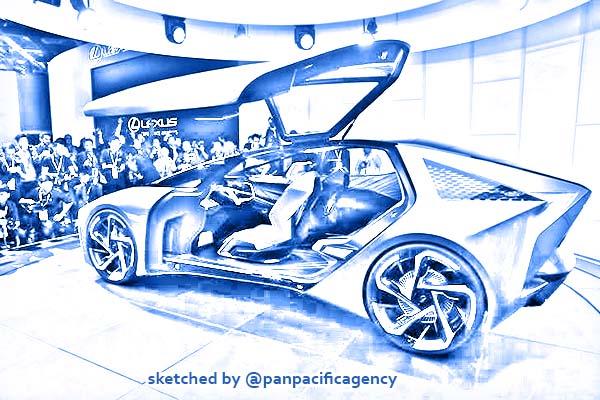EVs, short-range cars take spotlight at Tokyo Motor Show

People look and take photos of Lexus' new LF-30 electric vehicle concept car as it is unveiled at the Tokyo Motor Show, in Tokyo, Japan October 23, 2019. REUTERS/Edgar Su. Sketched by the Pan Pacific Agency.
TOKYO, Oct 23, 2019, Kyoto. Electric vehicles and cars designed for short trips are in the spotlight at the Tokyo Motor Show as automakers face growing pressure to address vehicle emissions and develop a growth strategy that will help them to overcome Japan’s shrinking market, reported the Japan Today.
The show opens to the public from Friday, running until Nov 4 at Tokyo Big Sight, with more than 180 companies and organizations showcasing products and services.
The participation of fewer foreign manufactures, however, reflects the changing role of auto shows.
Carmakers are turning to new ways to market to consumers such as social media while they continue to invest aggressively in research and development to keep up with evolving mobility trends.
While connectivity, autonomous driving, car-sharing and electric powertrains continue to be the major trends across the industry, battery-powered cars designed for short trips are being showcased by Japanese manufacturers.
Toyota Motor Corp is featuring an ultracompact electric two-seater car mainly targeted at elderly drivers and an indoor mobility device in which the user is transported in a standing position, both expected to go on sale in late 2020.
The company is aiming to have electric vehicles accounting for more than half its global sales by around 2025 — or about 5.5 million units, including 1 million EVs and vehicles using fuel cell technology, which converts hydrogen and oxygen into electricity.
Toyota also brought to the show an updated Mirai, which in 2014 became the world’s first mass-produced fuel cell car, touting a 30 percent increase in its driving range.
Honda Motor Co is displaying its first compact EV, the Honda e, which will be released next year. The model can provide useful information to the driver using artificial intelligence technologies.
“EV vehicles will comprise two-thirds of our global sales by 2030,” Honda President and CEO Takahiro Hachigo said at a press briefing.
RTS2SDR7.jpg
Nissan’s Ariya concept car Photo: REUTERS/Edgar Su
Nissan Motor Co unveiled its concept mini electric car IMk for urban transportation. It features an assistance system that enables the driver to park the vehicle remotely using a smartphone.
The company, which has been struggling to rebuild its brand image since the arrest in November of its former chairman Carlos Ghosn over alleged financial misdeeds, is also displaying the Ariya concept EV crossover, which enables hands-off driving while cruising on a highway.
Suzuki Motor Corp is introducing its concept car Hanare, which means “detached room” in Japanese. It has neither a driver’s seat nor steering wheel, with only passenger seats and a large display installed in the cabin.
“We have to change ourselves in line with the changing times to create new values and services for customers,” Suzuki President Toshihiro Suzuki told reporters.
Daimler AG, the parent company of Mercedes-Benz, and Renault SA are the only foreign automakers taking part in the Tokyo show in 2019.
Akio Toyoda, chairman of the Japan Automobile Manufacturers Association, told reporters last month that motor shows “have been less attractive in the digital age as a means to promote sales.”
The biennial motor show has seen falling attendance figures, with the number dropping to 771,200 in 2017 from 812,500 in 2015.
In a bid to attract more families and young generations to the show, the organizer will hold an event named “Future Expo,” featuring an e-motorsports video game competition and events jointly organized with KidsZania Tokyo to give children opportunities to experience jobs in the auto industry.